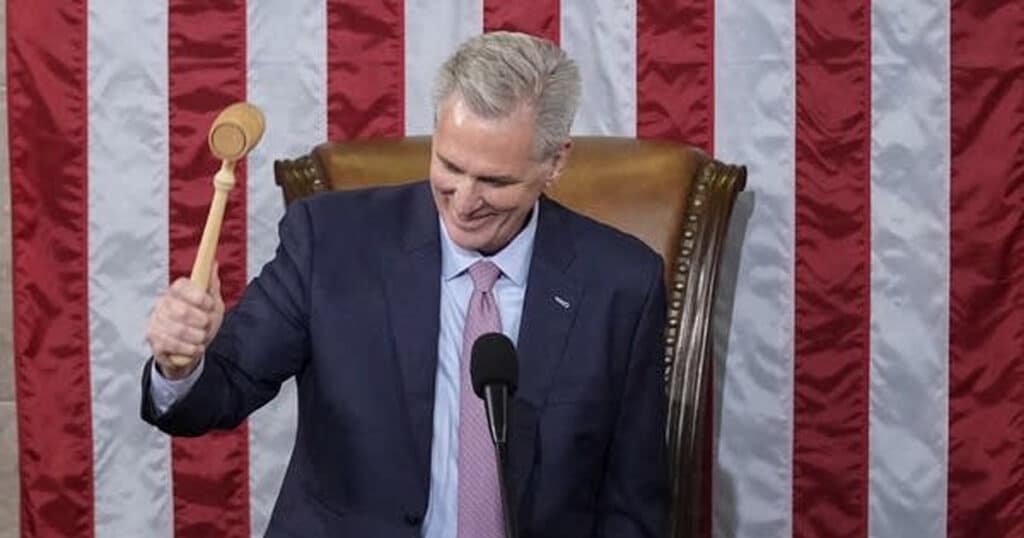
Debate Surrounding Choosing of U.S. House Speaker is Essential to Constitutional Self-Government
There has been much news this past week regarding the choosing of the next Speaker of the U.S. House of Representatives. U.S. Rep. Kevin McCarthy (R-CA) was considered the likely choice and has now become Speaker.
McCarthy, or any Speaker candidate, needs 218 votes to become speaker if all Members of Congress are present. Republicans have a slim majority of 222 lawmakers, so McCarthy could only afford to lose four GOP votes. The House adjourned Thursday evening after eleven attempts to elect a speaker, began its fourth day of votes Friday and McCarthy managed to gain the necessary votes in the 15th round of voting.
My point is that, in one of its frequent overreactions, the national “media” breathlessly proclaimed that “the U.S. House hasn’t failed this many times to elect a speaker since the Civil War.” Or that the failure to immediately elect a speaker resulted in “chaos.”
I respectfully disagree with those characterizations.
The intense focus on and debate regarding who would become the House Speaker is healthy, worthwhile and to be expected. We are a constitutional republic, within which we have chosen to govern ourselves as a representative democracy. That representative democracy is obviously based upon “representatives” and “representation.”
And, it was apparent that a bloc of U.S. House members was skeptical about McCarthy for one reason or the other. I never saw any indication that the opposition to McCarthy by House Republicans was of a personal nature but was ideological and policy based.
I served in the U.S. Congress in D.C. for almost 8 years. I worked for three members of the U.S. House and interned for a fourth. So, I know from experience that the position of speaker is a powerful one—the second in line for the Presidency. I’ve witnessed up close that once the speaker is chosen, the very direction of the U.S. House is set for the entire two years of that session of the Congress.
The Speaker determines membership on critical oversight and appropriations committees, including the procedurally critical House Rules Committee, which projects receive funding, and, most importantly, what bills actually come to the floor.
So, these last few days were the time to make objections and to debate what, in this instance, the Republican majority desired in its speaker. Clearly, a large number of Republicans were satisfied with the pledges McCarthy has made and the style of leadership and direction he will provide. Yet, a comparatively small but decisive—given the small Republican majority— group of Republicans were not.
The reason this debate is worthwhile is because even that minority of 20 or so Republicans who consistently opposed McCarthy for speaker have a right—if not a responsibility—to be sure that the voice of their constituents is also heard.
What do I mean by that?
Some of the opposition to McCarthy believed he had demonstrated certain policy beliefs they strongly disagreed with. For example, some don’t like the recent $1.7 trillion omnibus spending bill (yet another) that was just rammed through Congress and demand a change to the legislative process governing that.
Some believe McCarthy has never been strong enough on illegal immigration and the invasion that is occurring on our Southern border—including the drugs and crime that come with it. Some of these members of Congress have been passionate in their opposition to the weaponization of the federal government as it pertains to the partisan activities of several of our federal agencies in the last few elections. They seek a select committee of some kind to probe this issue.
Other members of this opposition simply see Congress as broken and demand that attention be given to their priorities in order for McCarthy to get their votes. Some of them demand a change to the House rules procedure regarding which bills can come to the House floor to be heard and debated, and which amendments may be offered to them. Some demand an opportunity to influence policy—a “seat at the table’’—when bills are being drafted. Some demand the right for a single Member of Congress to call for a no-confidence vote to unseat the House Speaker.
It takes great courage to take on the majority of your own party. However, demands had to be made and they had to be made at the time a new speaker was being chosen. That was done and the Congress—and the American people—are better for it.



